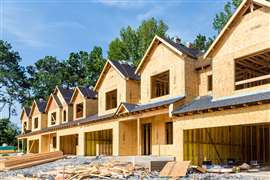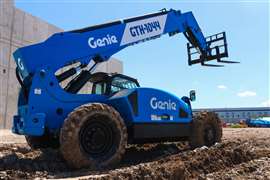Read this article in Français Deutsch Italiano Português Español
What’s driving the consolidation of US homebuilders?
13 May 2025
 Image: dbvirago via AdobeStock (stock.adobe.com)
Image: dbvirago via AdobeStock (stock.adobe.com)
The last few years have proven to be a good time to sell, if you run a business in the US homebuilding sector.
There has been plenty of consolidation in the industry and while the number of deals has fallen from a peak of 54 in 2021, following a flurry of activity after the Covid-19 pandemic, 2024 still saw 34 deals, which was slightly above average for the last decade.
It was mostly strategic acquirers – in other words, companies operating in the residential construction space gobbling up rivals – who accounted for 22 of those 34 deals. The other 12 involved financial sponsors – generally private equity companies.
At the same time, the amount that buyers are prepared to pay for companies in the housebuilding sector has increased significantly.
 Chart courtesy of Wipfli. Source: GF Data, Pitchbook
Chart courtesy of Wipfli. Source: GF Data, Pitchbook
The EBITDA multiples (earnings before interest, taxation, depreciation and amortisation) that buyers are willing to pay have skyrocketed from 4.2x EBITDA in 2006-2011, to 9.5x in 2021-2024, according to data from corporate finances advisors at Wipfli.
Multiples have increased as larger players in the US homebuilding sector, with large land portfolios, consolidate to address a housing shortage more efficiently and profitably, at a time when interest rates have risen rapidly and homebuyers are finding it harder to move up the housing ladder, says Colin Johnson, managing director of Wipfli.
Will the trend continue? Currently, it’s difficult to tell amid uncertainty around what happens in the US when it comes to interest rates, input costs, and recession risks.
“We’re in a very unusual set of circumstances with respect to policy and where the economy is at and where it is going. We’re monitoring that as closely as we can,” says Johnson.
Nonetheless, there is still low supply and strong demand in residential housing, especially at the luxury end of the market.
While would-be buyers of homebuilders may now be less able to project future performance of acquisition targets as a result of the economic uncertainty, there’s still potential value to be found in embedded profits in their backlog and land currently under their control.
“I think the US homebuilding and servicing sector is a really important area that is going to move regardless of where policy goes,” says Johnson.
 Colin Johnson, managing director, Wipfli Corporate Finance (Image: Wipfli)
Colin Johnson, managing director, Wipfli Corporate Finance (Image: Wipfli)
His colleague Brad Werner, national construction and real estate leader and partner at Wipfli, suggests valuations could continue to rise if private equity players start to get more involved in mergers and acquisitions of companies that operate in niche areas of the homebuilding sector.
Indeed, private equity companies have already shown strong interest in subcontractors specialising in areas like roofing, HVAC, pipe repairs, electrical work, concrete, and landscape services amid a shortage of skilled labour.
“Private equity companies have come into the HVAC and mechanical and electrical contractors space and are starting to build up platforms in these fragmented sub-sectors. Do they view some of these regional and local builders in the residential space as a real estate play that augments their strategy and build-out of a larger platform? I am curious to see where that trend goes over the next couple of years, especially in the luxury homebuilding space, where there is less sensitivity around macro factors like interest rates,” he says.
On the flip side, some smaller, non-luxury homebuilders could find that valuation multiples for their businesses come under some pressure, as big builders continue to consolidate.
“There’s a lot going on behind those multiples,” says Johnson. “The fact that you’re seeing consolidation of the larger players is one of the drivers of the multiples increasing. But there’s a lot of factors that could bring those [multiples] down as the competitive market becomes more saturated with a smaller number of even larger players. Outside of specialty areas like Brad was alluding to on the luxury side, it becomes harder for smaller builders to compete because the larger groups can do things just in a more cost-efficient basis.”
Advice for smaller homebuilders
Johnson and Werner have some advice for smaller homebuilders looking at selling their business on either to a strategic buyer or a private equity firm.
“It’s a really interesting time to make a decision to do something. I would try to do everything I could to have a really good pulse of the market. I would talk to my peers, talk to people at some of these larger firms, and ask questions,” advises Johnson.
He also suggests that operators of a company that want to attract a buyer make their operations as efficient as possible and make their land position as strong as possible.
Werner agrees that having a focus on internal processes and systems is important. “You could have a good team and a nice pipeline of land but if you have unoptimised technology systems and processes and partnerships with subcontractors that are shaky, I’d want to firm all of those things up,” he says.
Understanding who your company would align with strategically is also crucial, Werner emphasises. “They [buyers] are looking for one plus one to equal three. Make sure that whatever the vision and the strategy for your firm are, you have the tools and the infrastructure in place to scale. Ultimately, that is what an acquirer is going to want to see,” he adds.
Recent transactions for US homebuilders
Recent transactions that have seen major US homebuilders buy up smaller rivals and investment companies buy up companies in the space include:
- Lennar’s acquisition on 10 February 2025 of Rausch Coleman Homes. Rausch Coleman Homes offers move-in ready homes or allows customers to choose from available options on new homes in seven different states. Transaction value: $900 million.
- Defy Investments’ acquisition of Davis Homes on 4 February 2025. Davis Homes develops customisable home collections in Central Indiana. It specialises in the development and construction of residential subdivisions. Transaction value: Undisclosed.
- Dream Finders Homes bought Liberty Communities on 23 January 2025. Dream Finders Homes designs, builds and sells homes in: Jacksonville and Orlando in Florida; Denver, Colorado; the Washington D.C. metropolitan area; and Austin, Texas. Meanwhile, Liberty Communities provides homebuilding and construction services based in McDonough, Georgia. Transaction value: Undisclosed.
- McKinley Homes acquired Liberty Home Builders on 20 December 2024. McKinley Homes builders new homes in multiple states, while Liberty Home Builders develops residential properties in Houston and San Antonio, Texas. Transaction value: Undisclosed.
- Empire Communities bought Covington Homes on 30 September 2024. Empire provides real estate, land development, estate development and development construction services while Colorado-based Covington Homes provides home-building services. Transaction value: Undisclosed.
STAY CONNECTED


Receive the information you need when you need it through our world-leading magazines, newsletters and daily briefings.
CONNECT WITH THE TEAM












